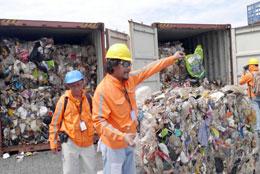Eco-group wants long-term solution on waste importation

Environmental group Greenpeace Philippines has called on Congress to craft a law that would totally ban waste importation for good.
Greenpeace Philippines issued the statement in light of the entry of tons of garbage from Canada, South Korea, Australia, and Hong Kong.
Most of the imported trash, however, had been sent back after the government adopted a strong stance against garbage being dumped in the country from other countries.
In a statement posted on its website, Greenpeace Philippines expressed skepticism that the stopgap measures being implemented by the Department of Environment and Natural Resources (DENR) and other government agencies could not prevent garbage importation in the long run.
For instance, Greenpeace said the DENR rule on imposing a three-month moratorium on all waste-related imports will likely help control trash importation but not put a stop on it altogether.
“We need urgent action on long-term solutions. If the Philippine and South Korean governments are serious in solving this crisis, they should act now to legislate a policy permanently banning waste imports. This should include prosecuting and penalizing parties involved,” Abigail Aguilar, Greenpeace Southeast Asia regional campaign coordinator, was quoted in the statement.
Most notable of the imported garbage that arrived at the Mindanao Container Terminal sub-port in Tagoloan, Misamis Oriental on separate occasions was the more than six metric tons of plastics from South Korea.
The wastes, which arrived in two batches from Pyeongtaek, South Korea last year, were imported by Verde Soko Philippines Industrial Corporation purportedly to be used as materials for its plastic recycling facility inside the Phividec Industrial Estate in Barangay Santa Cruz, Tagoloan, Misamis Oriental.
Verde Soko, a start-up company with a mix of Filipinos and South Koreans holding top positions, was not able to start it operation as the tons of plastic trash were red-flagged by both the Bureau of Customs and the DENR for wrongfully declaring them as “plastic synthetic flakes” and for failing to secure an import permit.
Early this month, EcoWaste Coalition has written to South Korean President Moon Jae-in and other political leaders in that country appealing to them to ship back the garbage without further delay.
In response, the South Korean Embassy in Manila has assured that it has coordinated with Philippine authorities for the reshipment of the garbage.
In January, part of the imported Korean garbage, about 1,400 metric tons, was returned to its country of origin.
But before the rest of the trash could be transported back to South Korea, it caught fire lasting 11 hours, inside the Verde Soko compound on August 15, raising health and environmental concerns.
EcoWaste Coalition national coordinator Aileen Lucero said the conflagration was a “wake-up call to speed up the removal of the garbage.”
“We can no longer allow another incident, accidental or deliberate, to occur and put the health and safety of the people at grave risk. President Moon Jae-in should now intervene to hasten his country’s re-importation of their trash,” Lucero added.






